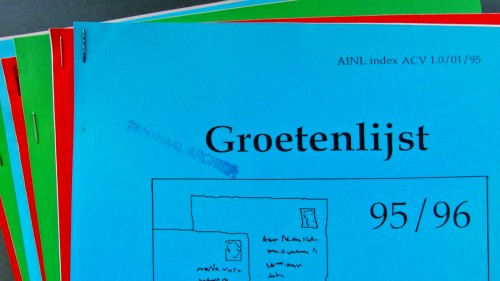The new greeting
Since the end of the 1970s, the December greeting action reappeared in new forms. Instead of focusing on Christmas, greeting actions were linked to the International Day of Human Rights on 10 December in the beginning of the 21st century. When Amnesty Netherlands started printing annual greeting lists since in the end of the 1980s, Dutch people could encourage prisoners in a new way. Schools, churches and other groups could make a selection of prisoners from the list, and organize greeting actions in a way that was suitable for them.

Greeting list of Amnesty International Netherlands, ca. 1988-1996
Courtesy of Archive Amnesty International Netherlands, IISH, Amsterdam
Members of my local Amnesty team can send words of support to people that are listed on the greeting list three times a year. I use the greeting list even more often myself. – Annemies, writing since the 1980s for Amnesty in Zaanstad, 2013
From the 2000s, Amnesty Netherlands put the annual greeting lists online. These lists had a broader scope than the old lists. Besides names of prisoners of conscience from all continents, addresses of human rights organizations were now listed as well. In this way, Amnesty encouraged not only individual victims of human rights abuse, but now supported the local activist groups that tried to fight this abuse as well, to empower local communities.
The greeting cards that we sent sometimes resulted in real answers. I have received a card from a prisoner twice, expressing how thankful he was for all the postcards he had received. – Mea, writing since the 1970s for Amnesty in Amstelveen, 2013

 Follow
Follow